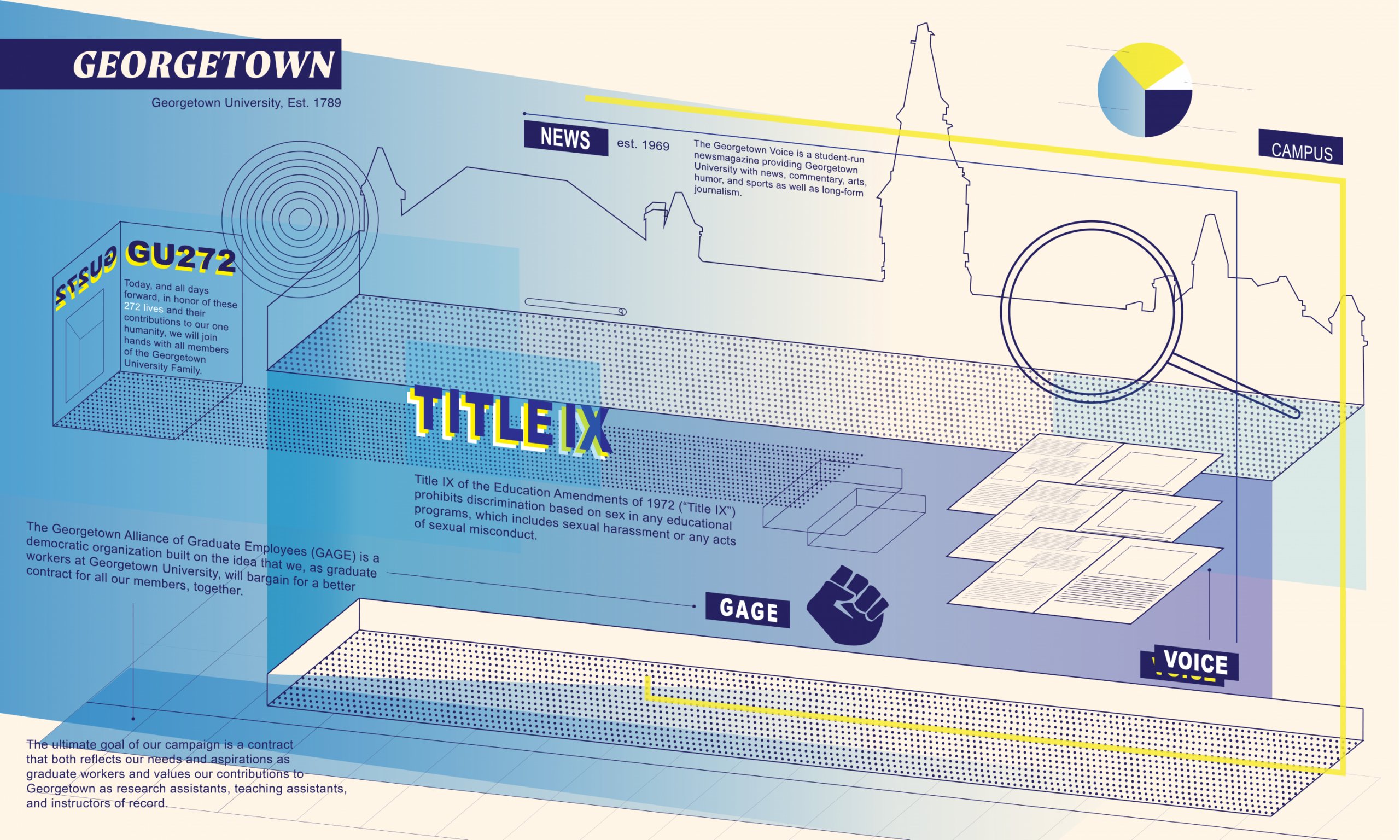This article is part of a series of explainer pieces by the Voice on some of the most important topics on campus. Other articles in the series can be found here.
It takes nearly 15,000 employees to operate Georgetown University each year. While some negotiate their employment on an individual basis, groups of workers on Georgetown’s campus have successfully unionized and reached collective bargaining agreements.
In some cases, unions have reached agreements with companies that the university contracts to cover essential services. For instance, Aramark, one of the largest food service providers in the U.S., employs workers in Georgetown’s dining facilities and negotiates with those workers directly. In other cases, unions reach agreements with the university itself.
Unions: The basics
A union is a group of workers who band together for the purpose of negotiating with employers to obtain desired employment conditions. Unions often negotiate over issues such as wages, working conditions, and hours members are required to work.
These unions can be recognized as legal entities, and can then obligate employers to bargain over the members’ terms of employment. This bargaining process is referred to as “collective bargaining,” and it may result in a formal, legally binding contract between the union and the employer(s).
The National Labor Relations Act (NLRA), passed in 1935 during President Franklin Roosevelt’s first term, guarantees most private-sector workers the rights to form workers’ unions, engage in collective bargaining, and carry out strikes. It also institutionalized a process for unions to be legally recognized by the National Labor Relations Board (NLRB), an independent federal agency responsible for ensuring fair labor practices under the NLRA.
The NLRA notably excludes public-sector workers, railway and airline workers, independent contractors, domestic workers, and farmworkers from its protections. Additionally, the Taft-Hartley Act, also known as the Labor Management Relations Act of 1947, was an amendment to the NLRA that restricted many types of union activities and permitted states to pass “right-to-work” laws, which prevent unions from compelling workers to pay for representation. Twenty-seven states, primarily in the South and Midwest, have passed these laws, though D.C. has not.
Unions at Georgetown
As private-sector employees not subject to the NLRA’s exclusions, workers at Georgetown have the right to bargain collectively, and many unions on campus have reached contracts with their employers. Most recently the Georgetown Alliance of Graduate Employees (GAGE), Georgetown’s graduate student union, secured its first contract with the university.
Other unions at Georgetown include the Service Employees International Union (SEIU), which represents maintenance workers, adjunct faculty, and janitorial workers, though the groups are represented in separate branches called “locals.” Adjunct faculty are represented by SEIU Local 500, maintenance workers are represented by SEIU Local 1199, and janitorial workers are represented by SEIU 32BJ.
Aramark food service employees are represented by UNITE HERE Local 23.
First negotiations
Georgetown maintains a policy called the Just Employment Policy that provides a floor for minimum compensation for full-time employees. This policy is intended to provide a living wage to employees and has been adjusted over time, from a minimum of $11.33 an hour when it was established in 2005 to $17.28 an hour as of Feb. 15, 2020.
The Just Employment Policy was established in response to student and worker organizing that began in 2002. This culminated in a hunger strike launched by students in March 2005 to demand a living wage for Georgetown workers. The ensuing policy applies to both university employees and contracted workers who work on campus but are employed by another company, such as Aramark.
In addition to wages, the Just Employment Policy affirms Georgetown’s commitment to providing a harassment-free environment, providing benefits to its employees, and guaranteeing the right to unionize.
The policy’s commitment to unionization, as well as the efforts of student activists, helped facilitate the establishment of the janitors’ union on campus. Shortly after Georgetown adopted its Just Employment Policy, janitorial workers, employed by P&R Enterprises, joined SEIU 32BJ.
The Georgetown Solidarity Committee (GSC), a recently-defunct student organization founded in 1996 to help students promote workers’ rights on campus and in the D.C. community, played a large role in both the establishment of the Just Employment Policy and the janitorial union.
In 2006, GSC members began working with campus janitors to join SEIU Local 23BJ. In Sep. 2006, the employees accepted their first union contract with P&R Enterprises, reporting the crucial role GSC members played in supporting the union through negotiations. Following the initial contract with P&R, GSC continued to be involved with contract negotiations for a variety of unions on Georgetown’s campus.
The contract for campus janitors included a pay raise of $2 per hour over three years, four weeks of vacation time, and six paid sick days a year.
First Aramark contract
Aramark employees began discussions of unionization in late 2009. Talks continued for over a year in secret before employees announced in Feb. 2011 that they intended to unionize.
At the time, Aramark’s contracts with Georgetown covered the Leo J. O’Donovan Dining Hall, the Cosi and Starbucks in the Leavey Center, the Dr. Mug in the Preclinical Building, and Jesuit residence Wolfington Hall. Aramark employees at these locations planned to vote to join UNITE HERE, a union that represented approximately 80,000 foodservice workers nationwide at the time.
Workers voted to join Local 23 and Aramark recognized the union in March 2011. However, it was not until almost a year later in Feb. 2012 that the union reached its first agreement with Aramark. The three-year contract provided a raise of 50 cents an hour every year, a promise of a forty-hour work week, and year-round health insurance.
Adjuncts’ Union
Adjunct faculty members’ attempts to organize began in 2012 and continued into mid-2013, ending on May 3 when adjuncts voted overwhelmingly in favor of unionizing.
The members certified SEIU Local 500 as the union’s representative, setting off the bargaining process. Bargaining continued for roughly 14 months until the union settled on a three-year contract with the university in Sep. 2014. The union voted to approve the agreement on October 28, 2014.
The contract addressed job insecurity, providing “good faith consideration” to adjunct faculty who taught for two years prior. It also increased the minimum compensation rates for three and four-credit courses.
Renegotiations
Since the original establishment of the unions, multiple rounds of contract renegotiations have taken place. For instance, the food service workers’ union successfully renegotiated their contract in April 2015, winning pay raises and improvements to their health insurance plan.
The new round of negotiations also included expansion of the union’s scope. Workers in Hoya Court, Einstein Brothers Bagels, and the Georgetown Hotel joined the union.
The union reached another agreement with Aramark in 2019 after the previous one expired in Dec. 2018. The new contract included raises, civil rights protections, and expanded healthcare, and is currently in effect.
A round of negotiations between the university and the maintenance workers represented by SEIU Local 1199 also took place in 2016, lasting for six months before ending that November when members voted to reject the tentative agreement, arguing that it did not offer a pay increase on par with the cost of living in D.C. The local later successfully negotiated a contract in Sept. 2019 that included a 3.2 percent pay increase and protections for workers under a subcontract.
The adjunct faculty union also renegotiated their contract after it expired in June 2017. Georgetown and the union came to an agreement in Nov. 2017 when the union voted to accept another three-year contract with the university.




